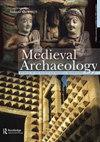The Perfect Sword. Forging the Dark Ages
IF 0.8
3区 历史学
0 ARCHAEOLOGY
引用次数: 0
Abstract
This is a thought-providing account of swords and warfare in early medieval Britain. The book features 16 chapters separated into three parts. Part I, Evolution of Swords, has a general chapter on swords followed by three period-specific chapters (Prehistory, Iron Age and Medieval) tracing forms and development. The six chapters in Part II, Creating the Bamburgh Sword, move through the process of forging a sword, from gathering iron into the smithing process, to fashioning hilt and scabbard. Here Gething and Albert work from the seventhcentury pattern-welded blade found in 1960 excavations at Bamburgh Castle by Brian Hope-Taylor – the rare object had gone missing until rediscovered in Hope-Taylor’s garage after his death in 2001. Part III, The Sword in Action, also of six chapters, contextualises swords in early medieval British society. The book is well produced by Birlinn. There are two maps at the front of the volume, locating key sites named through the text in Britain and Ireland c 650, and showing the Northumberland coast between Bamburgh and Lindisfarne. Other illustrations in greyscale primarily depict swords or their typologies, while a section of full-colour plates look especially at the Bamburgh artefact. While the chosen illustrations are appropriate, now and then the text merited additional images, for example when discussing the Franks Casket, gold-and-garnet decoration or sword pyramids. First and foremost, The Perfect Sword is a public-facing book for general readers, utilising the Bamburgh sword as the central focus of the work. The text is highly accessible and peppered with historical episodes, explanations and comparanda that make for an engaging narrative. Due credit is given to scholarly work, and the names of those scholars or the research themes discussed can be found in the index, as no referencing system is used. Key topics and conclusions of research are brought to the attention of the reader to better understand the Bamburgh sword specifically, and swords more generally. Perhaps of greatest value to scholars are the descriptions of experimental archaeology, including smithing, and the observations offered on how swords were used and fit within early medieval Britain. Such gems are scattered throughout the text.完美之剑。锻造黑暗时代
这是一本关于中世纪早期英国刀剑和战争的思想书。这本书共有16章,分为三个部分。第一部分,剑的进化,有一个关于剑的一般章节,然后是三个特定时期的章节(史前、铁器时代和中世纪),追溯剑的形成和发展。第二部分《打造班伯格剑》中的六章,经历了剑的锻造过程,从集铁到锻造,再到剑柄和剑鞘的成型。在这里,Gething和Albert使用了布莱恩·霍普·泰勒于1960年在班伯格城堡发掘时发现的七世纪图案焊接刀片——这件罕见的物品一直下落不明,直到2001年霍普·泰勒去世后在他的车库里被重新发现。第三部分,《剑在行动》,共六章,以中世纪早期英国社会的剑为背景。这本书是伯林精心制作的。卷的前面有两张地图,定位了650年英国和爱尔兰的关键地点,并显示了班伯格和林迪斯法恩之间的诺森伯兰海岸。其他灰度插图主要描绘剑或剑的类型,而一部分全彩板则特别关注班伯格的手工艺品。虽然所选的插图是合适的,但有时文本值得额外的图像,例如在讨论弗兰克斯的容器、黄金和石榴石装饰或剑金字塔时。首先,《完美之剑》是一本面向普通读者的书,以班伯格之剑作为作品的中心焦点。文本易于阅读,穿插着历史事件、解释和对比,形成了引人入胜的叙事。学术工作受到应有的重视,这些学者的名字或所讨论的研究主题可以在索引中找到,因为没有使用参考系统。研究的关键主题和结论引起了读者的注意,以更好地了解班伯格剑的具体情况,以及更广泛的剑。对学者来说,也许最有价值的是对实验考古的描述,包括锻造,以及对中世纪早期英国如何使用和装配剑的观察。这些宝石散落在整个文本中。
本文章由计算机程序翻译,如有差异,请以英文原文为准。
求助全文
约1分钟内获得全文
求助全文
来源期刊

Medieval Archaeology
Multiple-
CiteScore
1.00
自引率
0.00%
发文量
7
期刊介绍:
The Society for Medieval Archaeology exists to further the study of the period from the 5th to the 16th century A.D. by publishing a journal of international standing dealing primarily with the archaeological evidence, and by other means such as by holding regular meetings and arranging conferences. It aims to serve as a medium for co-ordinating the work of archaeologists with that of historians and scholars in any other discipline relevant to this field. While maintaining a special concern for the medieval archaeology of Britain and Ireland, the Society seeks to support and advance the international study of this period. The journal provides a forum for the discussion of important finds and developments within this period from anywhere in the world.
 求助内容:
求助内容: 应助结果提醒方式:
应助结果提醒方式:


